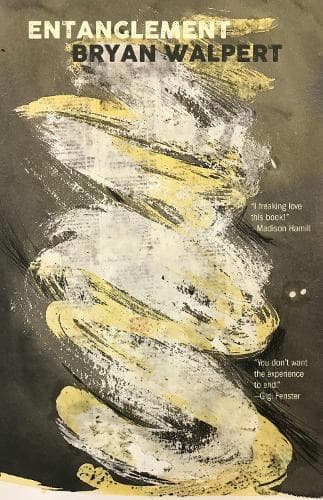Review: Entanglement
Reviewed by David Hill
When an established poet turns to fiction, reviewers often feel obliged to comment on whether techniques and skills from Genre A also feature in Genre B. This reviewer does, anyway.
Auckland's Bryan Walpert certainly qualifies for the “established” label. His poems are intellectually invigorating, stylistically adventurous, juxtaposing academic and every day. I mean, Isaac Newton's scientific peers assimilated into stanzas?
This is Walpert's first novel but he already has a prize-winning novella and a collection of stories in print. So, Entanglement, rather endearingly dedicated to the author's Mum, is the work of a qualified tradie. It's a narrative with much movement through time and place: two and a bit continents; two and a bit decades. We're flicked from a writer's retreat by a wintry South Island lake in 2019, to other ice-locked water across the globe, to Sydney University and its “Centre for Time” in 2011.
A Time Traveller burrows through the years, desperate to nullify sundering calamities, knowing “that for those of us who believe in physics, the distinction between past, present and future is only a stubbornly persistent illusion.”
Walpert certainly belongs to the physics-believing category. I'll come to that in a minute. But first, a little about the story. A high-flying, then deeply-grieving couple shove most of it along. Driven by guilt (I'm trying to avoid spoilers here) the chief protagonist chooses a breath-jolting course of salvation. “If you are successful, all of this will change. But....”
It's a narrative of multiple “Buts.” In outline, it may suggest Back To The Future for grown-ups, where “all worlds are possible.” We see the moments of carelessness that drive our man to attempt a shift among past / present / future (more spoiler-sidestepping from me here). There's injury and escape, suspense and separation. Events swell towards a marginally corny but pleasingly upbeat ending; I'm happy to disclose that much.
As I say, it's fiction packed with scientific fact. Stephen Hawking is quoted. Paul Dirac the Nobel Prize-winner appears as a neat nom-de-plume. Read about universal wave function, temporal epistemology, quantum tunneling, light cones, Minkowski diagrams, St Augustine. Einstein provides the book's epigraph.
Is it just showing-off? Definitely not. It's integral to the plot, it's outlined lucidly, and the Acknowledgements section shows how diligently Walpert has researched. You may need to put it down occasionally, while you walk around the room and let your brain cool, but whoever said reading was meant to be a passive process? As a member of the New Plymouth Astronomical Society – Public Nights: Tuesday; $5 entrance fee – I approve whole-heartedly.
Entanglement is a shuttle of brightly-lit, brightly-set scenes like the stanzas of a poem. Yes, yes, I'm back to my opening paragraph. It works hard at reconciling the simultaneity and subjectivity of time with the traditional linear objectivity of fiction.
It finds room for some pawky humour: if you return to the past, can you still put sugar in your coffee, even though you've given sugar up in your future – which is now another past? The language is close, streaming, yet often meditative. It evokes mundane moments of the daily world, even as it blooms continually into metaphor and imagery. (Indeed, enter the poet once more.) “...memory that flits away like a moth you once tried to capture in a paper cup;” “a dog that slams itself against a wire fence.” I do like that “slams.”
D H Lawrence claimed that the essence of a good novel was its “unexpectedness.” He was referring to the author being startled as much as the reader. In Entanglement, you feel that Walpert is frequently intrigued and surprised by his own material. The result is a story that jumps with energy, both emotional and intellectual.
Reviewed by David Hill
